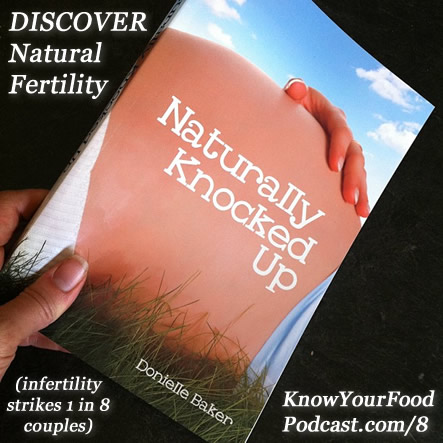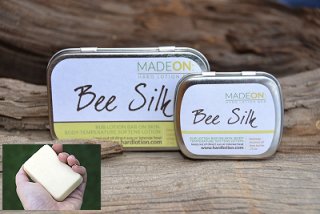
I’m tickled to introduce you to Donielle Baker, the author of the book Naturally Knocked Up and the blog of the same name.
Donielle is passionate about the link between food and fertility and has overcome her own infertility and helped countless others to improve their fertility naturally, through cleansing, real food, natural living, exercise, and super foods.
In this episode you’ll hear more about Donielle’s life, family, work, and new book. She shares the very real risks and issues with conventional fertility treatments. She gives her top three (natural!) tips for those dealing with infertility. And much more on today’s episode of Know Your Food with Wardee.
Click play below to listen to this week’s podcast! See below if you want other options.
Podcast: Play in new window | Download
Subscribe: RSS
Mobile or desktop users, you can hear my podcast with Stitcher, on-demand and on-the-go. (What’s Stitcher?) You can also get it on iTunes or subscribe in the Podcasts app. Please leave a comment or rating in iTunes and Stitcher!
What’s in Episode #8?

In this episode of Know Your Food with Wardee, I’m visiting with Donielle Baker, author of Naturally Knocked Up and NaturallyKnockedUp.com.
Donielle has an amazing fertility story:
“I was finally diagnosed with poly-cystic ovary syndrome in 2002, but only after I had hours upon hours researching my own medical issues. When I was 19, my doctor at the time just prescribed me The Pill, saying many women had irregular cycles and taking hormones through the pill would fix my problems. If and when I wanted to get pregnant, there was another little pill I could take that would force my body to ovulate.
The problem was, the pill wasn’t fixing any of my problems. In fact, in many ways, I believe it was making them worse. I was just giving my body fake hormones so that it didn’t have to try to produce any natural hormones itself. I suffered everything from migraines and stomach upset, to emotional instability. I was on these beastly little things for 4 long years and I had come to think that what I was feeling was just my ‘normal’. Little did I know how much effect they actually had on me.
It wasn’t until we started thinking about starting a family that I really started to look at the natural ways a person can increase fertility. I knew that it may take a long while for me to actually conceive and I wanted to make sure I was eating a “healthy”.
So I ate what is medically considered a healthy diet. Skim milk, wheat bread (store-bought) high fiber cereals (store-bought) and lots of fruits and veggies (non-organic). Although I was eating the best I knew how at the time, I would still go 6-8 months between cycles and I never knew when ovulation was coming. Fortunately we were able to become pregnant and I now have a son who was born in August of 2006.
Although I was able to become pregnant once, I knew that my body still was not functioning properly. Since my son was born I’ve spent hours and hours researching and reading about traditional, nourishing foods and natural fertility. I wanted to be able to regulate my body so that I never had to rely on fake hormones to either prevent or achieve pregnancy. Eight months after starting on my journey to better health, I was able to do just that. My body was finally receiving the nourishment it needed to regulate my cycles. Naturally.”
Here’s what I asked Donielle in this episode:
- What is your personal story of infertility and fertility?
- Why did you write a book about natural fertility?
- What is natural fertility?
- Why is infertility on the rise?
- Why do you advocate natural fertility methods over medical treatments?
- What’s in your book?
- Who is your book for?
- What top three tips would you give to someone struggling with infertility?
Also in this episode, I gave a shout out to Jim and Mary who were featured in this week’s farm tour: Old World Garden Farms. And a big thanks to B. Walsh for a 5 star review on iTunes!
iTunes update: If you subscribed to my podcast on iTunes early on, I must ask you to subscribe again as that original listing has been deprecated. This is because I had to start all over again at iTunes. My original submission to iTunes didn’t include the right information — like cover image or even my name as the author of the podcast. I figured out how to fix it, but unfortunately iTunes doesn’t let you update a listing –you have to start over. So I started over right here. Please resubscribe!
You’ll also hear my responses to a question asked on the podcast voice line. Here’s what Kerry from Wasilla, Alaska asked:
- What vegetables should I cook or ferment, and which can we eat raw on a daily basis?
Here are other links mentioned in this episode:
- Naturally Knocked Up — Donielle’s blog
- Naturally Knocked Up — the book
- Environmental Working Group’s “Skin Deep” cosmetic ingredient database
Enjoy this episode. 🙂 See below for how to submit questions and what’s coming next.
For past or current episodes, check out the Know Your Food with Wardee podcast archives.
What’s Coming Up…
Next week, I’m visiting with Renee Harris, creator of the beautiful and nourishing hard lotion products at MadeOn Hard Lotion.
It’s Your Turn
Questions for Donielle about fertility and infertility? Please feel free to ask. 🙂
Like this podcast? Please help me reach others by using the share buttons at the top of this post. Thanks!
We only recommend products and services we wholeheartedly endorse. This post may contain special links through which we earn a small commission if you make a purchase (though your price is the same).



Kerry’s question cause me to have a question…
Am I understanding correctly, that if I eat spinach, broccoli, cauliflower, etc. raw in a salad I will not be getting the full benifit of those foods unless I lightly steam them or ferment them?
Diana, that’s correct. The oxalic acid blocks mineral absorption, and it can be reduced through steaming or fermentation.
Thank you for your reply.